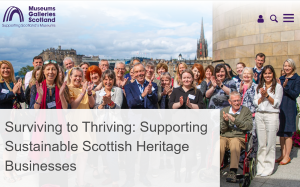 Following the success of the 2021-22 Business support programme ‘Surviving to Thriving’ programme’, BEFS and partners have been awarded additional Lottery funding.
Following the success of the 2021-22 Business support programme ‘Surviving to Thriving’ programme’, BEFS and partners have been awarded additional Lottery funding.
… Leadership….Governance….Business Planning….Community Engagement…
Museums Galleries Scotland (MGS) writes:
The NLHF funded Business Support Programme, ‘Surviving to Thriving’ (StT) was developed by MGS, Built Environment Forum Scotland (BEFS), and greenspace scotland to support heritage organisations in Scotland to develop sustainable business models.
The programme delivered a comprehensive resilience and leadership training programme for 39 at-risk heritage organisations across Scotland.
Training was tailored to the needs of participants, focusing on four main themes of leadership, governance, business planning and community engagement, and was delivered through leadership cohorts, training courses, organisational interventions, and bespoke facilitated sessions.
Designed to build resilience across Scotland’s heritage sector, StT invested in individual and organisational capacity through a focus on building confidence and knowledge in business practice.
This project was designed to upskill and support the work of the heritage workforce across Scotland, including representatives from at-risk organisations in all fields, but with a specific focus on those organisations with tangible assets.
Training directly engaged with the heritage workforce at vulnerable organisations and addressed the skills gaps identified as required for a thriving heritage sector.
The programme commenced in April 2021 and ran for 18 months, with participating organisations taking part in between 14-18 days training within that time period across the four strands.
Eligible organisations were awarded a community grant to enable them to fully participate in this skills programme.
Training Strands
Leadership
The core strand of this programme focused on Leadership and training encompassed leadership styles, personal and professional development, change and performance management, leading others to grow and develop, and how to support teams to develop shared values and create a shared vision.
Governance
The training delivered in this strand focused on interventions designed to support Trustees to understand their responsibilities, how to define their roles and how to work more strategically to embrace business opportunities. This strand also included training on good practise around sustainable board development, recruitment and fundraising strategies.
Business Planning
This strand supported participants to embrace the opportunities that come from running their heritage organisations as businesses and give participants the skills to approach challenges strategically. Training was designed to support participating organisations to embark on effective forward and business planning, including exploring and mitigating risk, understanding VAT and balancing social and economic impact.
Community Engagement
This strand supported organisations to better understand engagement as heritage businesses, and offered training in working inclusively and effectively with communities and building the crucial relationships required to enable heritage businesses to thrive as part of their locality and as part of the growing place agenda.
Training addressed participant skills gaps in marketing and commercial activity, while considering the organisations wider communication core activities and challenges. This strand also included training around evaluating and communicating the impact of heritage businesses as part of a wider advocacy strategy, helping these organisations to better articulate the impact they make on a local and national level.
Programme Benefits
- Individual participants (and their organisations) will have increased their skills in the areas they need to operate thriving heritage businesses
- The heritage workforce will be better able to manage change, embrace opportunity, and mitigate risk within their organisations
- Participants will have greater well-being through the establishment of peer-support networks and professional cohorts
- Participants will feel more confident through training and facilitation, and better able to share good practise across and beyond the heritage sector
- Heritage businesses will be equipped with confident, skilled, empowered staff and leaders who are motivated to embrace new opportunities to deliver their work
